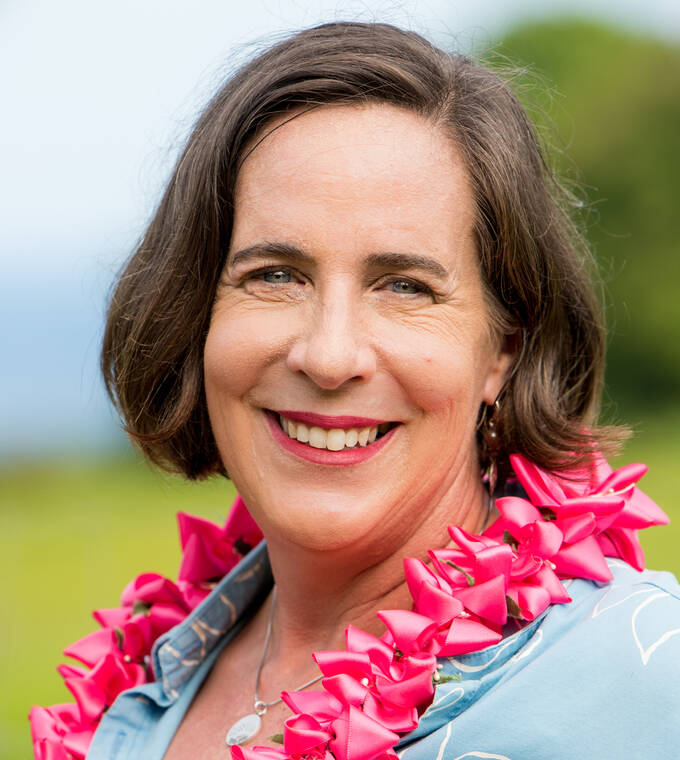A proposed revamp of the county’s vacation rental law includes registration — for the first time — of hosted accommodations and new regulations and fees for both hosted and non-hosted rentals.
It also paves the way for the creation of vacation nodes, where new short-term rentals could crop up in areas they’re currently banned.
Puna Councilwoman Ashley Kierkiewicz and Hamakua Councilwoman Heather Kimball, who worked on the bill with the Planning Department and Corporation Counsel, noted that county leaders had said they would revisit the law after it was approved in 2018 and implemented in 2019.
“It is still a work in progress and we recognize that the bill may still need revisions after we share it with the public,” Kimball said in a statement. “We look forward to hearing from our community.”
The draft bill, unveiled Monday in an online forum, will be the topic of another community session in January and will then begin its journey through the legislative process, with a hearing in the County Council Planning Committee in January or February, followed by trips to the Leeward and Windward planning commissions and then two readings by the council.
“We wanted to make sure we were walking everyone through these proposed changes and so we’re going to take our time with it,” Kierkiewicz said. “Some people might be stoked, others less so.”
Kierkieiwcz said almost 900 people signed up for the informational briefing on the online forum. A lot of people sent in comments and questions as well, she said.
“We appreciated the opportunity to introduce community to this first blush of the transient accommodations ordinance,” she added. “Our approach is to be flexible, listen to community feedback, and incorporate as much as possible so we can arrive at a piece of legislation that is fair and supports our local residents.”
Unlike current county law, which regulates only those non-hosted transient accommodations of 30 consecutive days or less, the new law would regulate rentals of less than 180 days, aligning it with state law. It also sets up fees and rules for hosted rentals, where the property owner resides on the property.
Transient rentals of guest houses, ohana units, second dwellings and additional farm dwellings are prohibited under the proposed law.
The proposal sets limits on the number of people staying at the rental unit. Two people will be allowed for each bedroom, plus two extra people for the unit. That means a two-bedroom unit could have a total of six people staying there, a three-bedroom unit could have eight.
A party at the unit that includes those staying there could contain no more than double the number of people allowed to stay overnight. So the two-bedroom unit, with six sleeping there, could have a gathering of no more than 12 people, under the proposal.
Transient accommodations owners will generally be paying more in fees all around, as the county works on increasing revenues beyond the local option 3% transient accommodations tax that was added last year. With increased revenues come the expectation of increased enforcement.
“Seeing it from an enforcement standpoint has been quite challenging,” said Planning Director Zendo Kern. “Some are good operators and some are not good operators, so we’re seeing abuse happening quite consistently.”
Kern said the plan is to ensure “anything that is some type of transient accommodation has a registration number. … These elements will be regulated in some way, shape or form all the way around.”
The proposed measures would allow the Planning Department, the County Council or a property owner in certain areas to apply for creation of a vacation node, an area where new rentals are currently prohibited after the nonconforming use grandfathering period expired. Locations where nodes might be created are areas where there is no hotel lodging nearby and there is sufficient infrastructure in place. Hawaiian Paradise Park, Kona Bay Estates, Puako, Volcano Village and Volcano Golf and Country Club are areas that could be considered.
North Kona and South Kohala are home to about 80% of short-term rentals on the island and 87% of complaints about them registered countywide with the Planning Department, according to a study conducted early this year.
Last month, there were 156,100 available unit nights in short-term rentals, a 15.2% increase over 2021, resulting in 51.6% occupancy, a 6.6% decrease from 2021, according to the state Department of Business, Economic Development &Tourism.
The average daily rate for short-term rentals in October was $240. In comparison, the average daily rate for hotels was $361 and occupancy was at 75.1%.
Email Nancy Cook Lauer at ncook-lauer@westhawaiitoday.com.


